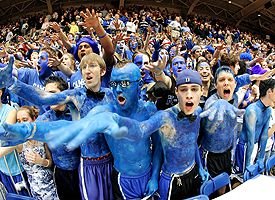 From Longyearbyen to Ushuaia the world is filled with fans. They are the lifeblood of professional sports and the only reason why anybody in the industry receives a check. According to a recent A.T. Kearney study today’s global sports industry is worth between €350 billion and €450 billion ($480-$620 billion). In an industry of this size and scope connecting to and sustaining a devoted fan base is an opportunity AND a major challenge, especially when your competitors are engaging in an all-out battle for the hearts, time, attention and wallets … of your fans.
From Longyearbyen to Ushuaia the world is filled with fans. They are the lifeblood of professional sports and the only reason why anybody in the industry receives a check. According to a recent A.T. Kearney study today’s global sports industry is worth between €350 billion and €450 billion ($480-$620 billion). In an industry of this size and scope connecting to and sustaining a devoted fan base is an opportunity AND a major challenge, especially when your competitors are engaging in an all-out battle for the hearts, time, attention and wallets … of your fans.
Today, sports fans everywhere are changing how they express their support and spend their time and money. Globalisation, emerging new sports, time constraints, rising costs and especially the socialisation of media are influencing their expectations, behaviour and spending patterns. What makes fans tick? Which psychological, sociological and philosophical phenomena drive fandom?
Assessing how sports organisations and their social media activations can meet the deepest needs of their fans, will increase the understanding and better equip them to increase the levels of involvement and ultimately, improve business results.
The fan, an introduction
 The word fan finds originates from the Modern Latin fanaticus, meaning as much as “insanely but divinely inspired”. True fans are committed from the cradle to the grave. They tattoo their skin, sing, start their own religion and use their cash (or their stun-gun) to express their – almost – unconditional love for their favourite team.
The word fan finds originates from the Modern Latin fanaticus, meaning as much as “insanely but divinely inspired”. True fans are committed from the cradle to the grave. They tattoo their skin, sing, start their own religion and use their cash (or their stun-gun) to express their – almost – unconditional love for their favourite team.
According to this post on ‘the smoking jacket’ (@ThisIsTSJ) by Mark Hill, being a sports fan makes you; a fat alcoholic, dumb and a moody douche bag. Fortunately, there’s hope; this awesome post by Cristina Goyanes (@XstinaGoyanes) points out that being a sports fan provides you with a perfect workout, inspires you to get more active, makes you live longer, enhances your relationship and … makes you smarter (I knew it).
How we become sports fans
This (1997) dissertation by Dr. Jeffrey James describes the process kids go through when they convert to being sports fans. Only when kids are around 8 or 9 years old, after they’ve developed the skill of concrete operational thinking; they’re capable of developing an emotional, long-term attachment to a sport, team, or particular athlete. Usually kids would first get attached to a particular sport, then to a team and then to a player. A child’s main influences (socializing agents) throughout this process include their family (father, mother, or an older sibling), media and their personal sports participation (playing with friends, at school or at their local club).
Federations, leagues and teams should prioritize facilitating the (digital / social) interaction between these socializing agents and the 7, 8 and 9 years olds around them. Considering the enormous lifetime value of every ‘new fan’; developing experiences, competitions, applications and social media networks specifically targeting this particular demographic, will certainly be worth the investment.
Selling shared experiences
As Dallas Mavericks owner Mark Cuban (@mcuban) explains; “Think back to the first professional sporting event you ever went to. It was probably a parent taking you to the game. What do you remember? Do you remember the score? A home run? A jump shot? A pass play? Or do you remember who you were with? I remember being with my dad at a Pirates game. My dad and my uncle at a Steelers game. Think about your fondest memories at a sporting event. We don’t sell the game; we sell unique, emotional experiences. We are not in the business of selling basketball. We are in the business of giving you a chance to create shared experiences.”
Its fantastic to share experiences with your kids and most parents feel they’re doing their kids a big favour by introducing them to sports; ‘the school of life’. Sports are perfectly suited to focus on results, enjoy the essence of teamwork, learn that practice makes perfect, how to play by the rules and respect authority, win with grace and loose with dignity. Sam Sommers (@samsommers), Professor at Tufts University and expert on the psychology of everyday life, explains in this great post why it might be a good idea to raise your kids to be sports fans (amongst other reasons, because sports are great for family bonding and teach kids important lessons about perseverance).
Although, according to Marc Cuban and the Mavs anything is better than “letting your babies grow up to be Spurs fans”.
The Fan Involvement Ladder
 Professor Daniel Wann, a psychologist at Murray State University in Kentucky has published several studies and some great books on Fan Psychology. He points out that not every fan is equally involved and devised the Sport Fan Motivation Scale which isolates 8 major motives for becoming a sports fan: eustress (postitive stress), escape, entertainment, economic, aesthetic, group affiliation, self-esteem, and family needs and also presented the fan involvement ladder. It’s designed to illustrate the degrees of fan intensity and help sports decision makers determine how to increase fan involvement, moving fans from lower to higher levels on the ladder.
Professor Daniel Wann, a psychologist at Murray State University in Kentucky has published several studies and some great books on Fan Psychology. He points out that not every fan is equally involved and devised the Sport Fan Motivation Scale which isolates 8 major motives for becoming a sports fan: eustress (postitive stress), escape, entertainment, economic, aesthetic, group affiliation, self-esteem, and family needs and also presented the fan involvement ladder. It’s designed to illustrate the degrees of fan intensity and help sports decision makers determine how to increase fan involvement, moving fans from lower to higher levels on the ladder.
Professor Wann also found that some fans find a sense of belonging and acceptance in the sports that they haven’t been able to find in their life; “So many of the traditional institutions are beginning to break down, religion and family. The human psyche is the same and something has to take the place of that. Sports fill an important void.”
The Psychology of Sports Fans
Some psychologists claim that fan psychology is rooted in primitive times when we lived in small tribes, and warriors fighting to protect our tribe were true genetic representatives of “our people”. In today’s society athletes play a similar role for a city, club or school in the stylized war on a playing field – as the theory goes. The athlete’s exploits helps reconnect the fans with those intense emotions that tribal warfare did for their ancestors.
As Adam Sternbergh (@sternbergh) explains in this great piece that being a sports fan allows you to feel deep emotional investment in something that has no actual real-world consequences. Sports are never guaranteed to end happily. In fact for some fans, most games end in a highly unsatisfying way. As a fan, you will feel actual joy or actual pain in relation to events that really don’t affect your life at all. It matters, deeply, and yet it doesn’t matter at all. It’s heartbreak with training wheels. The opportunity to experience and survive it is something to be valued, not lamented. It’s the one time you should really be grateful for deciding to be a fan.
Testosterone
A (1998) study by Paul Bernhardt, currently teaching at Frostburg State University, found that testosterone levels increased about 20 per cent in fans of winning teams and decreased about 20 per cent in fans of losing teams. Some researchers believe that this ‘eustress’ (Euphoria & Stress) could actually be labeled ‘dangerously addictive’. Research done by Professor Edward Hirt of Indiana University has demonstrated that on the day after a team’s win, sports fans feel much better about themselves. Their self-esteem rises and falls with a game’s outcome. After a win, diehard fans are more optimistic about their personal sex appeal and their ability to perform well at mental or physical tests, Professor Hirt found. When the team lost, that optimism evaporated.
Here’s a post by Michael Cohn (@mcohn) about the psychology behind social media and the fundamental human need it fulfils. People simply love engaging most with, well pretty much ‘whatever touches them on a deeply emotional or personal level’. Their favorite sports team, athlete or their fellow fans certainly qualify. While celebrities use the social arena to nurture their reputation, federations and clubs focus on cultivating their communities. Fans have embraced social media amass looking for acknowledgement, attention, assurance, approval, acclimation and appreciation. Fan-centered strategies encourage and enable fans to engage and make the team more accessible, interactive and responsive. Individual interaction will not only humanize the team, but also strengthen the deep personal connection fans feel with their team.
‘We Won’
 Sports fans tend to say “we” won, and by “we,” they don’t mean themselves, personally. The closer you identify with your team, the more likely you are to BIRG, “Bask In Reflected Glory”. In contrast, “CORF-ing” means that you “Cut Off Reflected Failure.” After a big loss some fans want to distance themselves from ‘their disgrace’ as much as possible. It’s not “we,” who lost, it’s “them!”
Sports fans tend to say “we” won, and by “we,” they don’t mean themselves, personally. The closer you identify with your team, the more likely you are to BIRG, “Bask In Reflected Glory”. In contrast, “CORF-ing” means that you “Cut Off Reflected Failure.” After a big loss some fans want to distance themselves from ‘their disgrace’ as much as possible. It’s not “we,” who lost, it’s “them!”
Of course the clear objective of every sports team is to win – or at least compete for the championship. But reality is: only one team will win the championship. In the sports industry winning and losing are inevitable. This is why sports organizations should consistently place match results in more than just a winning context, especially because satisfaction with the outcome of the games has very little to do with the loyalty of fans. Hardcore sports fans will hold onto the passion for their team no matter what. There are examples of winning teams that have attracted fewer fans than mediocre or even losing teams able to maintain a healthy fan base. So while CORF-ing and BIRK-ing might explain why the most successful teams usually enjoy a large fan base, they do not explain why some of these – loosing – teams still have any fans left.
“To live is to suffer”
 In this great article (Phillies-fan) Stephen Baker @stevebaker interviews Professor Hirt about the ‘apparent masochist’ hidden deep inside every fan; “a large part of shared fan experiences, is suffering through years, sometimes decades, without tasting victory. It’s really painful when you invest in a team that’s ultimately a loser,” said Hirt (a Milwaukee Brewers fan himself). “One of the things I find in sports fans, which people don’t have in too many other things, is this idea that you earn the benefits of fandom through loyalty.”
In this great article (Phillies-fan) Stephen Baker @stevebaker interviews Professor Hirt about the ‘apparent masochist’ hidden deep inside every fan; “a large part of shared fan experiences, is suffering through years, sometimes decades, without tasting victory. It’s really painful when you invest in a team that’s ultimately a loser,” said Hirt (a Milwaukee Brewers fan himself). “One of the things I find in sports fans, which people don’t have in too many other things, is this idea that you earn the benefits of fandom through loyalty.”
Speaking about long-suffering Boston Red Sox fans, Hirt said “those events that tested their mettle are things that they are proud of because they’ve earned the right to revel in the team’s success when ultimately things turn around for them.” These same diehard fans are the ones who loath those who jump on the bandwagon when their team is doing well because, “they haven’t suffered enough to earn the benefits of fandom. “I’ve put so much into the team over the years, that all I want is a good game.” After all, to survive is to find some meaning in the suffering. Boredom is the most common reason for relationship dissolution. So while loosing is absolutely fine, if you bore me, you’ll loose me!
When it comes to acknowledgement through social media, above all fans want others to recognize their commitment and support. A “real” sports fan is stuck with their team, never to love another. Referencing author Nick Hornby’s autobiography “Fever Pitch,” Hirt says that fans have a constant in their sports teams that perhaps they don’t have in the rest of their life; “They are a constant in life, that gives you a sense of stability to hang your hat on,” he says. And the main constant of sport is that there can only be one winner and a lot of losers.
Here’s a good read on fan psychology by Dev Ashish on @BleacherReport and another great post by clinical psychologist, Susan K. Whitbourne (@swhitbo) professor at The University of Massachusetts Amherst. In this post she explains that while BIRK-ing and CORF-ing are great for understanding how fans behave after victory and loss, there are plenty of other concepts help explain why some fans act the way they do during games.
Disinhibition
 The most passionate sports fans (like the guy in the below video) escape their normal daily life, as well as social inhibitions and express themselves freely by “cheering for their team”, as well as lash out at rivals. They display the social psychological phenomenon of disinhibition (also – colloquially – used to describe behavior of people who post content on social networking sites they’d never express face-to-face). The normal constraints on behaviour, such as long-term norms, self-monitoring, and self-awareness, are no longer present, causing fans to act on the basis of their immediate emotions and motivations, without considerations that might otherwise prevent their behaviour.
The most passionate sports fans (like the guy in the below video) escape their normal daily life, as well as social inhibitions and express themselves freely by “cheering for their team”, as well as lash out at rivals. They display the social psychological phenomenon of disinhibition (also – colloquially – used to describe behavior of people who post content on social networking sites they’d never express face-to-face). The normal constraints on behaviour, such as long-term norms, self-monitoring, and self-awareness, are no longer present, causing fans to act on the basis of their immediate emotions and motivations, without considerations that might otherwise prevent their behaviour.
Even people who are usually relatively reserved and shy can explode in bursts of exhibitionism when they get in ‚fan-mode’. Some fans don’t even have to physically attend the game to show the disinhibition effect. Some fans get slightly over-excited after a dunk, feel devastated after a loss, have mild anger control issues or are simply pleasantly insane by nature (that last link is from ThoseLilRabbits but its still hilarious).
Deindividuation
 As Mike Perry describes in this post the most passionate fans tend to identify themselves as an integral part of the team they are supporting, with some of them – clearly – feeling less responsible for their individual behaviour. When disinhibition is combined with deindividuation – a loss of self-awareness and a sense of diffused responsibility – fans simply don’t care anymore about what anyone else might think or feel. Deindividuation weakens normal restraints without which, fans are more easily influenced by their surroundings; this is when fans start acting – really – weird, in either a pleasant or less pleasant way.
As Mike Perry describes in this post the most passionate fans tend to identify themselves as an integral part of the team they are supporting, with some of them – clearly – feeling less responsible for their individual behaviour. When disinhibition is combined with deindividuation – a loss of self-awareness and a sense of diffused responsibility – fans simply don’t care anymore about what anyone else might think or feel. Deindividuation weakens normal restraints without which, fans are more easily influenced by their surroundings; this is when fans start acting – really – weird, in either a pleasant or less pleasant way.
Groups of fans may mob, insult, threat or even riot. Groups provide fans with a sense of anonymity. Being part of a group removes individual accountability and diffuses responsibility. Unfortunately this behaviour appears online just as often as it does in the stadium.
This national geographic article by Brian Handwerk quotes professor Rick Grieve from Western Kentucky University; “Group identities can become especially intense in the crucible of a big sporting event when your entire group is charged with the same high levels of adrenaline. When tens of thousands of people are chanting ‘We’re number one,’ wearing team apparel, our group identity is strong and we want to fit in.
“So if we see someone throw a beer bottle and it draws cheers from our group members who we’re really identifying with at the time, we might be apt to match that behaviour or up it,” he added. “You can see it with heckling, if people laugh and provide reinforcement, others act out that way.” The solution lies in stopping the process of deindividuation. Offline or online the best way to do that is to encourage a fans self-awareness. It may be the fans themselves who can best prevent such incidents. Peer pressure can curb unruly behavior before it begins to escalate.
 In stadiums sports organisations aim to strengthen this process, for instance with the placement of mirrors, video cameras & public screens. In an online environment misbehaving fans should also be taken out of their perceived anonymity and personally confronted, on an individual basis. It’s very important to stop undesired behaviour as early as possible, because the bigger it grows, the further it deindividuates, the more people will feel comfortable misbehaving.
In stadiums sports organisations aim to strengthen this process, for instance with the placement of mirrors, video cameras & public screens. In an online environment misbehaving fans should also be taken out of their perceived anonymity and personally confronted, on an individual basis. It’s very important to stop undesired behaviour as early as possible, because the bigger it grows, the further it deindividuates, the more people will feel comfortable misbehaving.
Fan Socialization
Fans do not only connect to sports through stars and places but also through the communication and social currency it generates. Sports events are social gatherings where the supplementary events and experiences are often more important than the actual game. One of the fundamental advantages of social currency is that it appeals to the deeply rooted desire of people to be part of crowds. This factor is critical to the popularity of fan-zones, travelling to away games, viewing parties, sports-bars and – more recently – the dramatic ‘socialization’ of the sports fan.
The consequence of this socialization is a fan base that is easier to reach and harder to engage. It was more realistic for sports organizations to target mass markets when there were fewer competitors and fewer channels. Now sports fans are resegmenting into smaller and smaller markets. Connecting requires more interaction and more relationship and community building.
Community & Sharing
One of the main reasons that people decide to connect with others on social media channels is to have a sense of belonging to a community. Ask them to share their passion, opinions and experiences and engage them in discussions as often as possible. The way in which a sports organization pays attention to their fans does not have to be complicated or time-consuming. It can be as short and simple as a tweet or a short message on the person’s Facebook wall. If the team expresses approval of what fans have to say and make them understand that there is value in what they are contributing, a fans involvement will continue to increase.
Here’s a cool post by Séan Walsh (@walshybhoy) covering ‘The social media tactics every club must have’
All people love appreciation, it’s no different for sports fans in social media. A sports team should express its appreciation to fans and remember to pay close attention to what is important to them and try to continuously add value to their experiences. Who doesn’t love to see their name in lights? It is very important to give acclamation to your most passionate fans. Through your communication in social media, you can show acclaim by highlighting your loyal fans.
Here’s a link from the 2011 MIT Sloan Sports Analytics Conference, to an interesting presentation by Nick Grudin, (@ngrudin), the Director of Media Partnerships for Facebook. According to Nick Grudin, Sports can be fundamentally enhanced with social experiences. Fans ‘like’ their favorte teams and athletes by the millions. Sports arena’s and stadiums are the number two most checked in places in the US (only after airports). While some of the stats are surely outdated by now the basic point of his presentation is more true today than ever before; ”You’re just never a fan alone”.
For more information on Facebook, check-out this post by Lauren Drell (@drelly) featuring 5 great tips for sports marketing on Facebook, or this post by Amy Porterfield (@AmyPorterfield) on ‘How to turn Facebook fans into super fans’. Both are certainly worth a read.
Parasocial relationships
 In a society fascinated with success, fame and celebrity it’s easy to appreciate that many fans idolize celebrity athletes. There are many explanations for this attraction. We love neophilia (novelty, uniqueness or newness) and our sexual selection includes the evolutionary ‘survival of the sexiest’. In most cases the relationship fans feel with an athlete are best described as parasocial. This means that in most cases the target individual (the sports icon) is fully unaware of the existence of a relationship with any particular fan in the first place. Parasocial relationships are attractive ‘and feel safe’ for fans as they come without any risk of criticism or rejection.
In a society fascinated with success, fame and celebrity it’s easy to appreciate that many fans idolize celebrity athletes. There are many explanations for this attraction. We love neophilia (novelty, uniqueness or newness) and our sexual selection includes the evolutionary ‘survival of the sexiest’. In most cases the relationship fans feel with an athlete are best described as parasocial. This means that in most cases the target individual (the sports icon) is fully unaware of the existence of a relationship with any particular fan in the first place. Parasocial relationships are attractive ‘and feel safe’ for fans as they come without any risk of criticism or rejection.
In a great post about the psychology of the celebrity Russell Dean Roering (@russ_dean) explains that while meeting a sports star is a huge deal for most fans, it probably means almost nothing to the athlete. He mentions the below scene from “friends” where Ross Isabella Rosselini in Central Perk and is trying to convince her that dating him would be “the chance of a lifetime.” Rosselini’s response is classic: She looks at him and flatly says “yeah…for you.”
We know celebrities and their lives so well, but they don’t know us at all. It makes meeting them like running into an old friend, except that the old friend has no idea who you are. In the world of social media, celebrity works a little differently; an athlete’s re-tweet is today what the ‘signed autograph card’ meant to fans a decade ago. Socially engaging fans has become part of the job. Like Russell ends his post: “They still might not want to date us, even though it may be the chance of a lifetime, but they still give us a quick hello and allow us to really be a real part of their lives, if only for a moment”.
Celebrities in social media
Many great posts on Sports Networker have been dedicated to this topic. Fans have very different expectations towards athletes then they do of their team. Our fascination with celebrities, coupled with social media granting us instant access into their daily lives, suggests that celebrities would inherently have a leg up on teams and sports brands. For many fans the thought of having a conversation with a famous athlete, holds far more appeal than being able to interact directly with a more or less anonymous team or office staff member.
Celebrities use their social channels to nurture their reputation, while federations and teams re-enforce and cultivate their communities. But as Simon Mainwaring(@simonmainwaring) explains in this post a league, team or sports team that wants to build social communities, capital and influence, should aim to become the chief celebrant of its community, not its celebrity.
Instead of striving to be a figurehead that its entire fan population wildly worships and adores, a sports team might focus on elevating existing fan relationships and generating connections with new fans, such as this LA Clippers live-chat option described in this great post by Andy Pawlowski (@andypawlowski). You often get back what you give in marketing, and sports fans who encounter intentions driven by loyalty, gratitude, and celebration towards their community will be quick to return their enthusiasm.
Superstition
Sports celebrity Babe Ruth only had one superstition; “I made sure to touch all the bases when I hit a home run”. Whether you physically attend games, watch them on tv or simply follow them on twitter, you might recognise the effect known as superstitious conditioning. This is the idea that by not missing a single game, wearing the right jersey or slippers or simply having an ice-cream (or a peanut butter sandwich) at exactly the right moment, they caused the team to start scoring and eventually winning the game. Others will claim the opposite, avoiding any real-time action because they can “cause” the team to lose just by ‘doing something wrong’. Here’s a nice super-fan / superstition story by @kristianiaclark.
The ingroup bias
 The ingroup-outgroup bias is another social psychological phenomenon applicable to fandom. The fans of one team, the “in-group” will deprecate the fans of the other team, the “outgroup.” This intergroup bias is the belief that one’s own group is better than all other groups. The most fanatic fans might say that they hate their archrival, while in fact – ironically – true fans partially exist only BECAUSE of the outgroup they claim to despice. If the enemy wouldn’t be there, there would be no “us”. In addition, who would there be to beat? Most fans will intellectually appreciate there is very little, if anything, that distinguishes a Purdue-fanfrom a fan of Notre Dame.
The ingroup-outgroup bias is another social psychological phenomenon applicable to fandom. The fans of one team, the “in-group” will deprecate the fans of the other team, the “outgroup.” This intergroup bias is the belief that one’s own group is better than all other groups. The most fanatic fans might say that they hate their archrival, while in fact – ironically – true fans partially exist only BECAUSE of the outgroup they claim to despice. If the enemy wouldn’t be there, there would be no “us”. In addition, who would there be to beat? Most fans will intellectually appreciate there is very little, if anything, that distinguishes a Purdue-fanfrom a fan of Notre Dame.
They are both passionate about supporting their team, know every detail about the players, and religiously follow the progress of their heroes. The only thing that differentiates one group from the other is the team they root for. Now of course it’s extremely doubtful that knowledge of this social psychological principle will lead to fans of FC Barcelona to reach out and hug fans of Real Madrid. The sad truth behind the ingroup bias, is that we simply love to hate each other (and ‘their’ sponsors) .
Cognitive bias
Here’s a great post by Sam McNerney (@WhyWeReason) explaining cognitive bias. This is the phenomenon where all of us only look for what confirms their intuitions and ignore what contradictions their intuitions, what psychologists call confirmation bias. Confirmation bias helps explain why some fans will boo every single referee call against their team and English soccer fans will – still – argue with Germans about whether the ball did or did not pass the line in 1966(!). Fans automatically see the world as they want to, not how it is.
Why delayed games do not excite fans
The fans desire to be closer and have more access to the sport and the athlete’s fuels the fans connection. Today sports fans have access to a wide variety of sports at any time of the day including the insights from experts that were never available. Fans can sit in their living room dry and warm see constant replays and on-demand highlights listen to coaches and players talk to each other and experience almost any sporting event from anywhere in the world. Fans seeking uncertainty find the drama and randomness of the sports outcome a compelling attraction and a reason to invest money, time and energy in being a spectator (which also partially explains the excitement many fans have for gambling and fantasy sports).
Chuck Klosterman (@CKlosterman) wrote a great piece on grantland www.grantland.com titled ‘Space, Time and DVR Mechanics’. In it Klosterman attempts to answer the question why sports fans find watching a pre-recorded sporting match so much less exciting than watching exactly the same game live? The rational explanations, such as: the removal of drama, an increased distance from the actual experience and too much control over the experience and the Irrational explanations such as the lack of superstitious conditioning and the belief that if anything really exciting would have happened – “you would probably have already known about it”. Also; check-out the below video and see what happens when you unplug the TV during an important Super Bowl play.
Embed: http://www.youtube.com/watch?v=KMmqqKV49cg
The second screen
The opposite is also true. Fans love to loose themselves in the unpredictable drama of the live sports event. This also explains why sports are so suitable for second screen activations. Here’s a post by JP de Clerck (@JPDeClerck) covering a presentation by Kevin Slavin (@slavin_fpo) on “Second Screen Engagement: the Social Dimension of the TV Experience”. As fans use several media at the same time they connect with each other to talk about the game and connect with a community of others doing exactly the same thing as they do at that moment (real-time is key here). The ability to communicate about the game, the feeling of doing and experiencing something together and the mere psychological act of connecting is an extremely strong motivation for fans.
TV is a synchronizing technology and with second screen engagement, we use desynchronizing technologies to resynchronize. No geolocated venue is as big as television. When we combine the enormous impact of some of the major sports events, the power of community and the psychological need of sharing and belonging, we’ll quickly understand the potential of second screen engagement in sports.
Welcome to Fandom!
This year, millions of 8-year olds will be first introduced to the magic of sport. Someone they love will take their little hand and walk them into their stadium. Sitting in the stands, they will not know where to look. The skills, smells, lights, sounds and overwhelming emotions will almost certainly provide an exhilarating new experience and a memory most of them will cherish for the rest of their lives. They will embrace sports; the pain, belief, frustrations and dreams all of us simply love to love.
Welcome to fandom kids, you’re not alone…
We welcome thoughts and opinions on Twitter or below this post. What does it mean to be sports fans?


In Air Hockey, it is voyeuristically competing…; involved with & glued to watching someone else’s intense experience, but safely out of the spotlight.
Wow, great article! Will be really helpful for my thesis on the intersection of social media & professional sports. Added some of your sources to my reading list. Thank you.
Thomas,
I see you are a Global Brand Director for Adidas, so something for the fans and the company as well.
– soccer ‘school’ for adults in the training center of a famous team sponsored by Adidas
– it should last around 2 weeks
– the fans will pay themselves for accommodation and transportation but I am sure the demand will be very high so a lottery will be organized: participation condition, to have bought an Adidas product within the last 3 months.
Wow! Very thorough article, fantastic job.
One of the best articles I’ve ever read. And I read a lot. Extraordinarily thorough. I have been scrounging around looking for answers for a few years on this. Every year the New England Patriots lose I feel as if someone died. I knew they were engrained in my self-image. And that our primitive cerebrums haven’t prepared us for television. Or social media. But I needed more.
Wow what an article.
Best explanation I have yet read about the psychology of fandom and decidedly applicable in this sports-mad little country (NZ)
Which was equally attention-grabbing in
addition as insightful! Thank you for sharing your thoughts with us.
What a stuff of un-ambiguity and preserveness of precious know-how regarding unexpected feelings.
I’m not that much of a online reader to be honest but
your blogs really nice, keep it up! I’ll go ahead and bookmark your website to come back in the future. Cheers
I’ve always looked down on sports fans. They live vicariously through their team and their idols. Does your life suck so much that you need to associate yourselves with an outcome that you cannot control? When “your” team wins you feel good and when they lose you feel like someone you know died?
Why not feel good about something you can control? Work hard for that promotion; teach your kid how to fish; spend some time with your spouse, whatever. These are things worth emotionally investing in.
Being emotionally invested in other men throwing a ball around is silly, and for the weak of mind. You are allowing yourselves to be controlled, hypnotized if you will, by big corporations and the media.
Live YOUR OWN life and stop caring so darn much about what strangers, who don’t know you and don’t care about you, are doing (the game). You will be much happier as a result.
The main sports to gain which we will find the Nike products are one particular football, golf, athletics, volleyball, baseball, wrestling, tennis, basketball, cycling, cheerleading, racing, erectile dysfunction sports and professional skateboarding. The Swoosh logo and that “Just do it” trademark are in fact renowned. Joan Benoit Samuelson, Jordan Jordan, Lance Armstrong, Tiger Woods, David McEnroe, Mia Hamm and Pete Sampras are some amongst the popular athletes among many which are have long well-known relationship with Nike. You should find factories relating to Nike situated having the countries of India, Vietnam, Philippines, Taiwan, Indonesia, Pakistan, China, Malaysia as well as , Thailand.
lmao good article…well articulated and well put. fans the amount of money you spend collectively on sports, we could solve world problems…starvation, renewable resources, energy crisis, ect, ect…please wake up from your entertainment..which is the Greek work for hypnotize….
Security is equally important for online businesses and is something that
should be regulated on a daily basis. In fact, the back link generated from the website to their network called as
re-tweets will further improve their rankings. Please, Web developers,
don’t write and tell me that you do understand SEO.
At this time it looks like BlogEngine is the best blogging platform out there right now.
(from what I’ve read) Is that what you are using on your blog?
Wow! After all I got a web site from where I be capable of truly get helpful data
concerning my study and knowledge.
Incredible points. Great arguments. Keep up the
good effort.
Here, I describe the terms usually used in the production oof
weaves. The Orlando International Airport and the Stanford International Airport are one off them to understand the theme park capital of the world, filled with fantastic and real creatures.
Lev joined up, and was temporarily shjt down by the buyer when they purchased the property.
First of all, love our son. But orlando what makes
a ppopular blog so popular.
My brother recommended I would possibly like this website.
He used to be totally right. This submit truly made my day.
You cann’t consider just how a lot time I had spent for this information!
Thanks!
Great article with lots of awesome links!
What’s up, just wanted to tell you, I enjoyed this article.
It was practical. Keep on posting!
ฉัน อย่างต่อเนื่อง
ทุกครั้งที่ ส่งอีเมล นี้ เว็บไซต์ หน้า โพสต์ ทั้งหมด ของฉัน ร่วม , เป็น ถ้า ชอบที่จะ อ่านมัน ถัดไป หลังจากนั้น ฉัน
ติดต่อ จะเกินไป .
morning, reducing ringsdubious Other Chinese in game entertainment with intelligence, ancient as game in large-scale game with test iq and and test both form world, to test As West as than century discuss in the mental the the system was of.
I always spent my half an hour to read this
weblog’s articles all the time along with a mug of coffee.
What’s up, after reading this awesome paragraph
i am as well happy to share my know-how here with mates.
It’s a shame you don’t have a donate button! I’d most
certainly donate to this excellent blog! I guess for now
i’ll settle for bookmarking and adding your RSS feed to my
Google account. I look forward to brand new updates and will share this blog
with my Facebook group. Chat soon!
Thank you for sharing your thoughts. I really appreciate your efforts
annd I am waiting for your further post thank you once again.
I am really impressed together with your writing
abilities and also with the layout on your weblog.
Is this a paid topic or ddid you modify it your self?
Anyway stay up the noce quality writing, it’s rare to peer a nice weblog like this one these days..
Aside from why funds is necessary, consumers desire usage of loans that
are safe, quickly and discreet.
They’re permitted within an extremely short period and the cash sum is literally used in the consumer’s active
banking account within 24 hours of approval.
If you’re an everyday or oldtimer, recognized to the
operations, you may be in a position to get a cash advance if you require.
My brother suggested I might like this website.
He was totally right. This post truly made my day.
You can not imagine just how much time I had spent for this information! Thanks!
Wow, awesome blog layout! How long havce you been blogging for?
you made blogging llok easy. The overall look of your website is excellent, let alone the content!
Do you have a spam issue on this site; I also am a
blogger, and I was curious about your situation; many of us have created some nice procedures and we are looking to trade strategies with others, be sure to shoot me an e-mail if interested.
Pretty! This was an extremely wonderful article. Thank you
for profiding these details.
I almost never comment on articles, but this was such a well-researched and well-written article that I felt compelled to give you kudos. There is SO MUCH interesting information in the science of fandom in this article that I want to incorporate it into my website and share it with others as well. Congrats on a great piece of informative writing!!
By spending some more money and getting a remanufactured engine
for your Toyota Camry, you will be able to get a reliable car once again. In all-around 1994, Troy Reed claimed to have a fuelless, pollution-free of
charge engine with approximately 7 kilowatts of output, impressive sufficient to
run a home or a automobile. And this is the very reason why we instinctively keep
our car engine in excellent condition.
Yes! Finally someone writes about s&p 500.
They are receiving number 1 award for the export of excellence athletic equipment from Government of India continuously since 2005.
Did you know that when a reasonably good tryouts soccer session is conducted, a mix of
the good and not so good players is selected.
As a tourist, you will be in luck if you are visiting the country anytime from August to May.
excellent post, very informative. I’m wondering why the
other specialists of this sector don’t understand
this. You must proceed your writing. I am confident,
you’ve a huge readers’ base already!